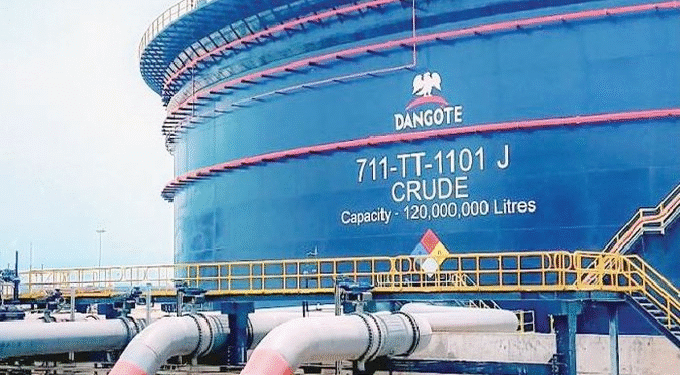The Dangote Petroleum Refinery has dismissed claims that its petrol unit could be shut for two to three months, describing the report as “fake news.”
The clarification came after Reuters, citing industry monitor IIR Energy, reported that the unit at the 650,000 barrels-per-day facility had been shut since August 29 due to catalyst leaks, with repairs possibly lasting months. The report further suggested that the refinery planned to attempt a restart of its 204,000 bpd Residue Fluidised Catalytic Cracking Unit (RFCCU) by September 20.
Responding on Sunday, Dangote Group spokesperson Anthony Chiejina strongly refuted the claims. “Fake news. Why ‘could’ if they are sure?” he told The PUNCH, questioning the credibility of the report.
The refinery, which began processing crude in January 2024, has already reshaped global fuel flows, slashing Europe-to-West Africa gasoline exports from around 200,000 bpd in 2024 to about 120,000 bpd in the first half of 2025, according to Kpler data. It has also shipped two gasoline cargoes to the US East Coast, marking its entry into the American market.

Looking ahead, the refinery is targeting a ramp-up to 700,000 bpd by December 2025. In August, it imported Ghana’s Sankofa crude—a medium-sweet grade heavier than its usual light-sweet feedstock—for the first time, further diversifying its supply mix.
Kpler data showed crude deliveries to the refinery surged to a record 570,000 bpd in July, with US light sweet crude accounting for 60 per cent of inflows, overtaking Nigerian grades for the first time. The remaining 40 per cent came from domestic supplies such as Amenam, Bonny Light and Escravos.
“This marks a notable shift driven by ongoing challenges in securing local barrels and the cost competitiveness of US WTI crude,” Kpler noted, highlighting the refinery’s flexibility in handling a wide range of grades.
Current throughput is estimated at around 445,000 bpd—68 per cent of its total capacity—up from 400,000 bpd (60 per cent) in the first quarter. Analysts expect operations to remain at similar levels in the coming months, with a slight dip projected during routine maintenance scheduled for December–January.
The Minister of State for Petroleum Resources (Oil), Heineken Lokpobiri, has previously stressed the need for Nigeria to ramp up crude production to meet both domestic and export demands, amid the refinery’s growing appetite for feedstock.









